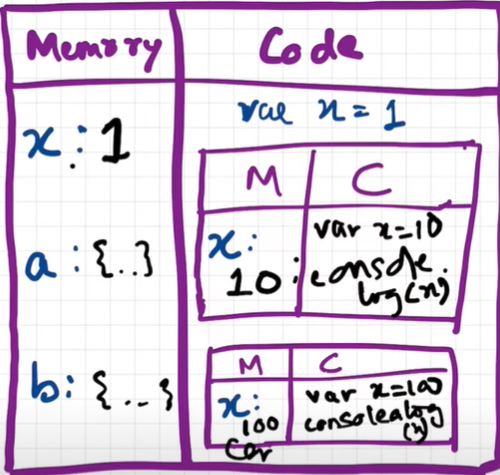Episode 4 : Functions and Variable Environments
var x = 1;
a();
b(); // we are calling the functions before defining them. This will work properly, as seen in Hoisting.
console.log(x); // 3
function a() {
var x = 10; // localscope because of separate execution context
console.log(x); // 1
}
function b() {
var x = 100;
console.log(x); // 2
}
Outputs:
10
100
1
Code Flow in terms of Execution Context
- The Global Execution Context (GEC) is created (the big box with Memory and Code subparts). Also GEC is pushed into Call Stack
Call Stack : GEC
-
In first phase of GEC (memory phase), variable x:undefined and a and b have their entire function code as value initialized
-
In second phase of GEC (execution phase), when the function is called, a new local Execution Context is created. After x = 1 assigned to GEC x, a() is called. So local EC for a is made inside code part of GEC.
Call Stack: [GEC, a()]
- For local EC, a totally different x variable assigned undefined(x inside a()) in phase 1 , and in phase 2 it is assigned 10 and printed in console log. After printing, no more commands to run, so a() local EC is removed from both GEC and from Call stack
Call Stack: GEC
- Cursor goes back to b() function call. Same steps repeat.
Call Stack :[GEC, b()] -> GEC (after printing yet another totally different x value as 100 in console log)
-
Finally GEC is deleted and also removed from call stack. Program ends.
-
reference:

Watch Live On Youtube below:
